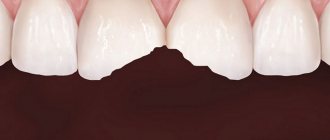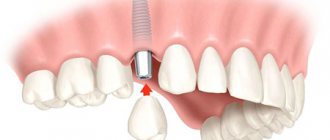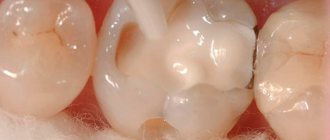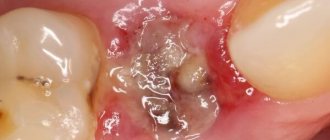What dictionaries say
There is no interpretation of this expression in Dahl's dictionary, but there is a reference to it in the explanation of the concept of “squeeze.” The author of the dictionary believes that you can grit your teeth in anger. Ozhegov’s dictionary also gives an example with the word “squeeze”, explaining the expression as “keep silent, endure.”
The synonym dictionary defines the expression as “to force oneself to restrain oneself.” The phraseological dictionary adds that in literary language this expression is considered colloquial and expresses expression. A person can use it while holding back feelings of protest.
The dictionary of many expressions interprets it as “show restraint.” Michelson's dictionary considers the expression allegorical, used in cases of describing anger or rage.
What other languages have this expression?
We find similar expressions in German and English. In German, the expression die Zähne beißen literally translates as “to bite your teeth.” It is used by E.M. Remarque. Germans can also say: Ich biß die Zähne zusammen. This literally means “I bit my teeth together.”
The English language also has this phraseological unit. J. Rolling, for example, in the series of books about Harry Potter uses the expression to gritted his teeth (“to gritted his teeth”) like this: Harry gritted his teeth and nodded (“Harry gritted his teeth and nodded”).
But there is an even more ancient expression: Bite a bullet, which literally translates as “bite a bullet.” Interestingly, this idiom was first a literal description of a procedure used in place of anesthesia. The fact is that in the 1700s, during emergency surgery on the battlefield, soldiers were given a bullet in their mouth to distract them from the pain. The man did not scream so much and was distracted: in order not to swallow the bullet, it was necessary to control its position in the mouth.
Over time, the expression “bite the bullet” has become allegorical and now means “doing something unpleasant, uncomfortable.” This could be making a difficult decision, driving an old car, passing an unpopular law for the sake of future benefits.
In French there is the same expression (mordre la balle), literally meaning “to bite the ball.” In Italian there is stringere i denti, which translates to “tighten your teeth.”
“Grit your teeth and endure,” or Why my father is a tough guy
If we take this description as a constant, then my father is cool. There is, perhaps, nothing that he could not do with his own hands . Wood, metal, plastic, glass, ceramics, concrete - he finds a common language with any material and tool as if he had been doing this business all his life. Lay tiles in the bathroom and at the same time resolder all the water pipes? Easily! Repaint the Niva from boring beige to camouflage in a couple of evenings? It's a piece of cake . At such moments, I understand that my whole life will not be enough for me to learn to do half of what my father can do.
Once, when I was still a junior schoolboy, my mother, grandmother and I went to the sea for a couple of weeks in the summer. When we returned, there was a new closet in my room. It looked like it came from an expensive furniture catalogue: with a facade made of solid wood, with stacked doors in a nautical style - everything I love. Now you can go to a store for those who like to craft and buy all the necessary elements: sawn chipboard sheets for the body, ready-made doors and handles for every taste. But in the mid-1990s, none of this existed yet, and dad had to do everything with his own hands. Only the door hinges and screws on which the cabinet was assembled were purchased. Almost a quarter of a century has passed since then, but I still remember that feeling of admiration for my own father.
Needless to say, the desk in my room and the carved wooden swivel chair with comfortable armrests were also made by my father . Times were not the easiest back then, and we couldn’t afford to buy furniture for the nursery. So dad solved these issues as best he could.
During my student years, I went on my first category hike to the mountainous Crimea. And although the complexity of the route was not high, my father said:
“Son, if it’s difficult, don’t complain. Remember that you are a man. Grit your teeth and endure.”
The advice came in handy: while climbing Mount Demerdzhi near the Angarsk Pass, the weather suddenly deteriorated, which, in principle, is not uncommon in the mountainous Crimea in May. The warm breeze gave way to cold gusts. Snow fell from the sky, which in a minute turned from sunny blue to hopeless gray. It quickly turned into sharp ice chips that cut his hands and face. At some point I realized that I could hardly move my legs. The group overtook me and went higher, and with the last of my strength, gritting my teeth, I slowly walked along the path. A friend came down to pick me up and offered to take my backpack, but I politely declined. My father’s words were spinning in my head : “Grit your teeth and endure.”
And I got there. Myself. Of course, I didn’t have time to take a photo with everyone on the top of the mountain, but I didn’t give up and proved, first of all, to myself that I can do much more than it seems at first glance.
Thank you for this, dad.
Vadim Kumeiko
The nature of phraseological units
When a patient comes to a doctor’s appointment and says: “I clench my teeth hard,” this indicates a certain symptom. In medicine, the following clenching of the jaws is distinguished:
- As a reaction to an event (anger, fear, physical stress).
- Involuntary grinding of teeth (bursism).
Apparently, observing people’s behavior in various situations gave rise to this expression. Interestingly, the Holy Scriptures mention “weeping and gnashing of teeth” as people’s reactions to punishment.
The life of modern people is characterized by a fast rhythm, heavy workload, all kinds of problems and stress. New diseases have appeared, caused by the body functioning at the limit of its capabilities. One of them is bursism. This is an unconscious strong clenching of the jaws, often during sleep, leading to pathology of the oral cavity and masticatory apparatus. Doctors unanimously name the reason - the inability to relax and rest, and cope with negative emotions.
Clinic doctors
One of the common problems is overstrain of the masticatory muscles, which manifests itself in the form of increased clenching of teeth and bruxism (grinding teeth in sleep). Hypertonicity of muscles occurs in children and adults. And among the reasons are stressful situations, overwork, spinal pathologies and dental factors such as:
- malocclusion;
- absence of some teeth;
- poor quality fillings;
- Difficulty getting used to braces or dentures.
In addition, you need to take into account the presence of bad habits. Smoking, alcohol, and caffeine abuse stimulate the cerebral cortex and cause insomnia. In turn, sleep disturbances increase the risk of developing nighttime jaw spasms.
How does increased jaw clenching manifest?
Problems due to teeth clenching can be identified by the following signs:
- pain in the mandibular joint;
- restrictions on opening/closing the mouth;
- increased wear of chewing teeth;
- the appearance of chips on fillings;
- clenching of teeth during maximum concentration or in moments of anger;
- night grinding of teeth;
- fatigue of the facial muscles when talking or chewing for a long time;
- pain in the temples due to emotional fatigue;
- frequent tongue biting;
- ringing or pain in the ears;
- sinus pain;
- daytime sleepiness;
- soreness of the facial muscles after waking up.
If such symptoms appear, it is necessary to consult a neurologist and dentist to determine the causes of severe clenching of teeth and complex therapy.
What causes constant clenching of teeth?
If measures are not taken, increased clenching of teeth can lead to unpleasant consequences:
- dysfunction of the temporomandibular joint develops;
- the lower jaw becomes more massive;
- the bite is disturbed;
- chewing muscles become inflamed;
- teeth become sensitive and fragile;
- headaches and spasms of the facial muscles occur.
If teeth grinding and excessive tension in the masticatory apparatus are left untreated for a long time, the neck muscles ache and posture deteriorates.
How is excessive tooth clenching treated?
Treatment methods are selected taking into account the causes of teeth clenching. Young children do not require special treatment; usually by the age of 6-7 years the problem disappears on its own. Medicinal, psychotherapeutic, dental and physiotherapeutic techniques are applicable to adult patients.
If psychogenic factors play a role, it is important to practice relaxation and self-control. To reduce the activity of the masticatory muscles during sleep, the doctor prescribes vitamins, sedatives and mild sleeping pills. In some cases, massage and manual therapy sessions are useful.
Dental methods for treating bruxism and muscle hypertonicity involve the participation of a therapist, periodontist, orthopedist, and orthodontist. A set of measures may include:
- production of protective mouthguards;
- correction of bite;
- selective grinding;
- prosthetics;
- implantation
And only after eliminating the causes of the pathology do they begin to correct aesthetic defects - eliminating wedge-shaped defects, placing fillings, crowns, veneers.
As for the prevention of increased jaw clenching, it is not difficult. It is enough just to get rid of bad habits, normalize your psycho-emotional state, learn self-massage and relaxing techniques. It is also important to treat teeth in a timely manner and monitor the health of the nervous system.
When a person wants to grit his teeth
Under heavy loads, the jaw compression mechanism operates in the body. In this case, the tension is concentrated in the masticatory muscle. It increases in volume if a person is in danger and is the strongest. The average person develops a force of up to 72 kg; the Guinness Book record is about 400 kg.
Athletes are well aware of this phenomenon. They learn to relax the masticatory muscle during periods of heavy physical activity. This frees up the spine and directs energy in the right direction. This action requires enormous concentration. People who are not involved in sports are not recommended to imitate athletes, as this makes it difficult to evacuate stress. This can lead to stomach ulcers. Sedatives that lead to muscle relaxation, sagging of the lower jaw, and block the release of tension. This prevents the body from overcoming stress.
As you can see, gritting your teeth in certain situations is normal. This is, for example, what players do in tug-of-war.
In what cases is this expression used?
There are several life situations when it would be appropriate to use the idiom “grit your teeth”:
- When you need to endure something: physical or emotional pain, an unpleasant neighborhood or period of time. When for the sake of the future good you need to endure the hardships of the present day.
- When you need to restrain your temper so as not to say too much.
- When you have to do unpleasant or dangerous work.
- When you need to show courage.
All of these situations fit the meaning of “gritting your teeth.” But there are cases when this is no longer a figurative phrase, but a direct threat to health. A facial expression with clenched teeth is a sign of severe pain. Often these are heart problems. In such cases, emergency medical attention is required.
“You can’t believe while gritting your teeth...”
Hegumen Tikhon (Borisov)
The first day of our huge, long, most difficult saving spiritual journey has passed - the first day of Lent!
The Holy Church humbly and meekly takes each of us by the hand and leads, very delicately and carefully, into the mysterious space of Great Lent! For ten weeks a year, our spiritual map is the Lenten Triodion: three weeks preparatory to fasting, six weeks of fasting, and Holy Week.
“Open the doors of repentance, O Life-Giver!” Through these doors we will go from the “Easter of the Crucifixion” to the “Easter of the Resurrection”...
The previous weeks - about the tax collector and the Pharisee, about the prodigal son, about the Last Judgment - were for us a tuning fork, helping to tune the heart into a repentant mood, and Forgiveness Sunday was the starting point, the condition for correctly entering the space of fasting, because, as F.M. Dostoevsky through the mouth of Elder Zosima: “Everyone is to blame for everything before everyone else!” And Elder Sophrony (Sakharov) advises: “We must give amnesty to each other.”
There are several fasts in the Church Charter, but Great Lent is a special Cosmos, a special architecture, the whole Universe, this is the deepest space of a person’s attempt to change his heart. And all the varied tools of fasting: the canon of St. Andrew of Crete, remarkable in its depth; repentant prayer of St. Ephraim the Syrian; Sundays dedicated to selected saints; Presanctified Liturgies; the pain of Holy Week and much, much more. All this should wake us up, pull us out of the usual life routine and hibernation!
We will not be alone in the Lenten journey, otherwise everything would turn into therapeutic fasting and psychoanalysis sessions. Helper and Patron - the Lord Himself will be our guide! It was He who fasted in the desert for forty days! It was He who suffered and died for us on the Cross, and rose again, giving us eternal life! “You were not redeemed with corruptible things, silver or gold, from the futile life handed down to you from your fathers,” teaches the Apostle Peter, “but with the precious blood of Christ, as of a lamb without blemish and without spot, predestined before the foundation of the world...” (1 Pet. 1:18-20 )
And if we stop only at giving up chicken and some kind of entertainment programs and do not turn our attention to the depths of our hearts, this means that we will not move from a dead point, we will not even take a single step forward! Saint John Chrysostom discusses this: “So, what have you, brother, collected through fasting? Do not tell me that “I fasted for so many days, did not eat either, did not drink wine, suffered uncleanness,” but show me whether you became meek, while you were angry, and whether you became humane, while before that one was cruel, because if you are intoxicated with anger, then why do you oppress your flesh? If there is envy and greed inside, then what is the benefit of drinking water?”
And, of course, despite the fact that fasting is a specific structure with its own charter, its own program, its own tradition, fasting for each of us is something very deeply personal, individual, intimate... Because we are very different! Each of us has our own holy corner, our own struggle, our own relationship with God! What one considers a trifle, for another is a huge problem, complexity, and overcoming! And vice versa. Everyone has their own front line!
Therefore, we will consult with our confessor! Measure your life against the Holy Scriptures! Seek answers to your questions from the holy fathers. And finally, learn from life itself through the circumstances that are happening to us now. And, of course, the main thing of fasting is heartfelt repentance, a change of heart! “Repent, for the kingdom of heaven is at hand” (Matthew 3:2).
In the Holy Scriptures we see that the Forerunner, and Christ, and the apostles constantly preach repentance and remind us that it is the main act for the salvation of the soul! “Mourn, weep and howl; Let your laughter be turned to weeping, and your joy to sorrow” (James 4:9). Reverend Abba Dorotheos generally advises asking yourself every six hours to know how we spent them and what we sinned in!
But repentance is not a frown, not knitted eyebrows, not a deliberately gloomy facial expression! Repentance is a deep feeling, in the words of St. Athanasius the Great, that my soul, which “was created to contemplate God and be illuminated by Him... instead of God, sought the corruptible...” “Repentance is the trembling of the soul before the gates of heaven,” concludes St. Isaac the Syrian. Therefore, let us always try to remember and understand that true repentance always brings deep spiritual joy to the soul! St. John Climacus gives the following comparison: “Crying and sadness contain joy and joy, just as honey is contained in a honeycomb.” “Rejoice always, pray without ceasing, in everything give thanks” (1 Sol. 5:16).
“You cannot believe while gritting your teeth,” wrote Sergei Fudel, “this is very unreliable and this is an insult to the Lord... The great feat now is to maintain faith, and not gloomy, as if driven into some kind of dead end, but faith-love, loving faith, faith, rejoicing in her Christ." The world does not know this spiritual joy! He doesn’t know the miracle that happens in the human soul after sincere repentance!
…Once a man asked the Athonite monks from the Dionysiates monastery to let his son, a university student, live for a couple of weeks in their monastery. The guy went to church as a child, took communion, but then, as often happens, he left the Church, went to a faraway country... Drugs, girls, a free lifestyle. In general, there are many sins and temptations. And, living in a monastery, out of false shame I did not dare to confess! And at the same time, in the monastery there lived a man possessed by a demon, whom the monks accepted for a while out of pity for the unfortunate man. And every time the possessed man met this young man, he began, shouting loudly, to list the terrible sins committed by the student. It was impossible to listen to this! Other pilgrims heard this, so the monks did everything to prevent these two from intersecting on the territory of the monastery. Finally, the young man, through the prayers of his father and brothers, decided to confess. This was a serious step for him; he had not confessed since childhood! Together with a guide, he went to the confessor, who lived two kilometers from the monastery. The confession was sincere, deep, serious... In tears, determined to change his life, the young man returned to the monastery. The demoniac was already waiting for him at the gate! He, of course, knew nothing about confession! “Now I will tell the whole world about your iniquities! - the demon shouted through the possessed. “I will read all your vile sins!” He held his hands as if they held a book. “So, I’ll start with the cover, I’ll reveal all your ins and outs!” And suddenly a miracle happened! The possessed man’s tone suddenly changed: “What is this? Where are your sins? Why can't I see them? Where did they go?" The possessed man no longer saw anything in his “book”; it was empty. The epitrachelion of the confessor, like an eraser, erased all the sinful darkness from the soul of the young man!
The grace of God helps us change our lives, our hearts... But we also need our desire, consent, we need a step forward! We need synergy!
Fasting is an attempt by the Church to awaken our sleeping heart, so that our life “will become wiser,” as St. Justin of Serbia says. So that we remember that “God became man, so that man became god”!
Fasting is not only about sauerkraut. This is our humble prayer for the whole world, for those near and far, for the sick and healthy, for the church and for those who are still searching, at the beginning of their journey!
“The Lord with His energy, His Divine light, His love permeates the entire cosmos, the entire creation, the entire universe... And man is called, by perceiving this Divine energy, to transform himself and the entire world around him!” – says His Holiness Patriarch Kirill. “The Light of Christ enlightens everyone!” - we will hear at every Liturgy of the Presanctified Gifts.
“Man without God is nothing! – wrote the Optina hieromonk Daniil (Bolotov). “A piece of broken wire!” Fasting is the restoration of spiritual connection: with yourself, with your neighbors, and most importantly - with God! And this connection should work everywhere: at home and in church, on vacation and at work, on the subway and in the store. Our whole life should become a spiritual life, every moment of it, and not just on Sundays and holidays!
“He who has the Son of God has life,” exclaims the holy Apostle and Evangelist John the Theologian, “he who does not have the Son of God does not have life!” Fasting is our attempt, our sincere desire to live this unique, real, living life! “I am the Way, and the Truth, and the Life,” says the Lord. “No one comes to the Father except through Me” (John 14:6).
March 15, 2021
Social media
Short link:
copied
Let's sum it up
It turns out that this expression is a consequence of observing human behavior in various situations. It is not artificially invented and is not the creation of a writer. It turns out that it was generated by the body’s natural defense mechanisms in stressful situations. How can one not recall similar catchphrases:
- The veins are shaking.
- Fly with happiness.
- My heart jumps out of my chest.
- Be petrified by surprise.
- The hair on my head is moving.
- Goosebumps.
- My soul has sunk into my heels.
Without these figurative expressions there would be no bright, original language. People are not robots. They express their creativity in speech. And anyone who has ever experienced something similar will definitely talk about it.









